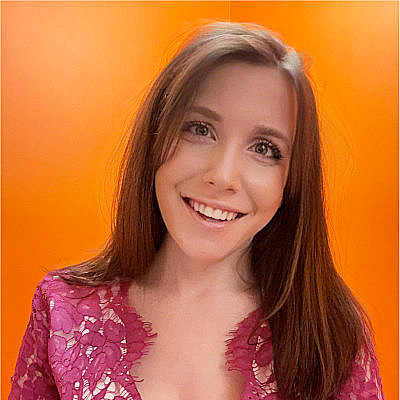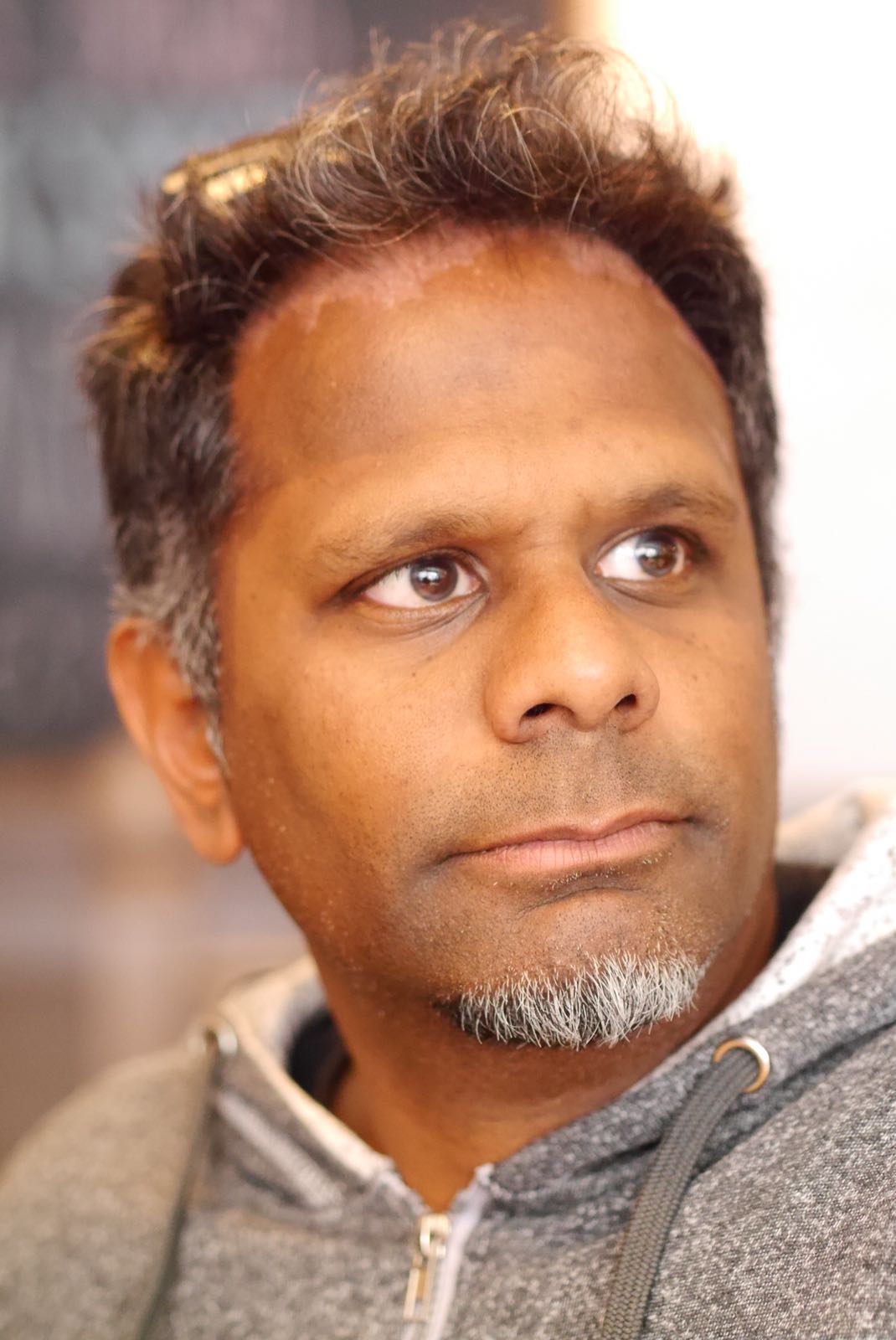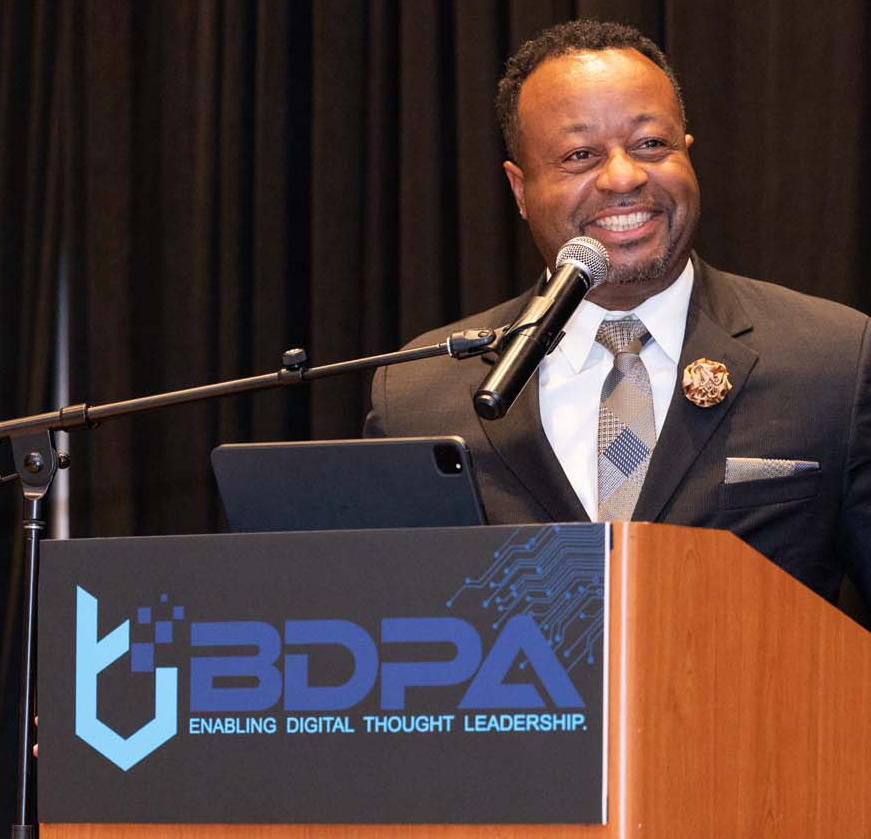Building diversity in the workplace with Jamil Shabazz
- 0.5
- 1
- 1.25
- 1.5
- 1.75
- 2
Intro: Business Schooled.
Darryl Pereira: Welcome everybody. This is the Business Schooled Podcast where you'll learn how the world of business is being redefined. My name is Daryl Pereira and I'm a content strategist here at IBM. Today I'm happy to be joined by Jamil Shabazz. So Jamil, can I ask you to tell us a little bit about who you are, what you do, where you come from?
Jamil Shabazz: Absolutely. Well first of all, thank you, Daryl for having me on your podcast, The Business School Podcast today, I greatly appreciate it. Peace. And blesses my friend. Jamil Shabazz, who is Jamil Shabazz? Jamil Shabazz is a middle aged man who has been in IT for about 30 years. I do a lot in the community with helping our young, shall I say, marginalized communities to help bring STEM into those areas where we are actually changing the game. And as well as teaching my eight daughters that I have myself all through college, I'm very blessed to say, put them all through school, and making sure that they're game changers too, to continue the legacy of Jamil Shabazz. So married. Been married for 15 years and basically I just want to be a game changer and a north star to our community.
Darryl Pereira: That's awesome. And wow, we could probably do a whole episode on bringing up eight daughters, having just two kids keeps my hands full. So in terms of yourself and your career, what have been say some of the, for you, defining moments that have helped you get to this point where you are today?
Jamil Shabazz: I think being a risk taker was basically getting into IT back in the 90s at 21 years old. It was an untapped area, especially for African Americans in that space because currently today there are only 7% of us in the IT field here. So you can imagine what it was back in the early 90s. So I saw a computer disc and I realized that you can fit a whole encyclopedia or a bible and a whole catalog or something on one disc. I was fascinated by that technology and I said" I got to learn it." So at 21, 22 years old, I took the opportunity to sign up for some courses that were being given in the local community center. And then I took advantage of moving forward from there to acquiring a job in some sort of computer/ warehouse where I could actually be in front of a computer typing in orders and stuff off the shipping manager. How exciting, and then of course graduated from there, got some certifications and got a job at IBM. And so it took a couple years to get there, but I took the risk of learning some new technology in order to better myself and family. So I think that in this area that we live in, like I said, we have to disrupt not just the normal pace of the game but ourselves and taking risk, knowing that the benefit outweighs the risk itself is definitely something I would definitely stress to anyone who want to go that route.
Darryl Pereira: I love that idea. What you say about taking risks. Obviously that was some years back when you took those risks and they've wonderfully paid off and it's awesome to see the fact that you've taken that and you're using that in a way that brings up others. But in terms of how do you characterize, let's say, some of the changes then that you've seen over the years? Are we in a better, you said there that now we're 7% of the Black population is represented in technology, which is obviously, I know for a fact, for instance, just doing some research here, I'm in Silicon Valley and I know that the Black population's roughly about 25%, I think just less than that of the overall population, but it's the same thing. There's about 7% in tech, so there's this massive disparity. Is that something, I don't know, are there inaudible have lied, are there areas where it's getting better, what have you seen over the course of your career in terms of especially the idea that certain communities are largely excluded from things like technology?
Jamil Shabazz: Yeah, I think it has a lot to do with the availability of technology. So it is no different than going to certain communities and seeing old history books versus newer ones, right? And let's think about that in the technology arena as well. What I've seen is that now obviously that those numbers have increased where there's more people of color that are in the IT field and they're learning technology, but you shouldn't think about it right now, we all have these phones. So in some form or fashion, we're forced to have to learn technology because we use it every single day. 20 years ago, we weren't using our phones to look for directions or to Google or maps on the app to tell you where to go turn left here, go four blocks there, two miles there. No, we had to go print on a MapQuest and we had to look at the map and look at the street to make sure that we were on the right path. So technology has actually been forced upon us to make us use it. And of course, obviously if we're all using it to some degree while there's an iWatch or hear the podcast or websites or whatever, we have no choice but to learn it in order to function because you know as well as I do, Daryl, years ago, okay, you got a flip phone, you know, it was nice, but now your phone has become a part of your anatomy, so to speak. It's become your third arm or hand and you would be totally lost without it. And what is your phone? Technology. So you have to be a part of that in order to actually live a, I don't want to say a normal life, but you have to be a part of that to be a part of this intellectual life of technology. And it's changed and we now are part of that. I say we, people of color, we're developers, we're programmers, we are change agents, we are individuals that are changing the game, but still the problem is we need to increase those numbers from 7%.
Darryl Pereira: Right. And do you think somewhere in there is this idea, it's interesting what you say, the fact that the technology is all around us I'll say. I was telling somebody recently, I do remember, I've been around long enough to remember a paycheck being actually literally a paycheck and everybody would be at the bank on a Friday at lunchtime. inaudible. Just waiting and this was somebody who's, I think, a millennial and it totally blew her mind on this idea. But yes, so this technology is there, it's around us. Do you think there's a degree to which where within certain communities, where they're heavily using the technology, but then the thing that is missing is that because they're not seeing that's there's people like them in roles, they have role models they can follow, that it means that they're not making that connection that, hey, I'm great, I can do all this stuff. I can do TikTok all day long. I can do all kinds of stuff, but you're not making that connection that actually to get into, there's different aspects of tech and you could get into certain aspects of tech just because if you build on that bit of knowledge that you've got and what you've got, do you think there's something around that that can be part of what you're saying in terms of addressing this very real and urgent problem?
Jamil Shabazz: Oh, absolutely, absolutely. I mean, myself going to schools and speaking to students who have not been introduced or around technology and seeing someone like myself, " Well, you're an IT director, you are in technology and you look like me. Wow. How did you get there? How can I be like you one day?" Goes back to their North Star state, the guiding light. So basically these individuals won't feel like they hit a glass ceiling, that they can burst through it. I tell these children all the time, how can I tell you to reach for the stars when its footprint's on the moon? So I want to make sure that they understand you can go as high as you can go and be successful, but seeing me, understanding my journey, understanding that you have one thing that I didn't have, you've got me, you have a mentor, a coach, a leader who can help you along the way. And so it's our job to be the Sankofa bird, which is a Ghanaian bird. And like I said before, the Sankofa bird walks one way or looks back. So as I said, Sankofa bird is moving forward, is always looking back to grab somebody else with it. So as you move forward in your career, you always got to look back to be able to give back or shall I say, young, talented professionals and give them an opportunity to know that they can do it too because we all have to raise not just a village raising a child, an educated community raises one.
Darryl Pereira: For folks that are listening, let's hear a little bit more about BDPA, its mission, its core, and how it relates to this in terms of like you say, this idea of looking back as you move forward.
Jamil Shabazz: Yes. Our BDPA, which stands for Black Data Processing Associates, got started in the mid- 70s, been around for about 45 plus years, and it started with Mr. Earl Pace. He was the founder, our BDPA, the mission is to take children from the classroom to the boardroom. What does that mean exactly? Once again, we are promoting science, technology, engineering and math. We put on conferences, we have speakers, we go to different sites, to schools, and we're really focusing on bringing more people of color into the IT space, not just being IT workers or developers, but being IT leaders. We want them to lead and be change agent and bring innovation and technology and once again, to disrupt this IT space. So BDPA's mission is to really grasp onto these high school students and these college students and even as far as some middle school students, and to really get started at a young age so that we can just kind of build them as they go, support and next year, those are tomorrow leaders and create a more diverse workforce. We can look up and say, " Hey, there's Johnny we knew as a sophomore at this so- and- so high school." I look at Johnny 10, 15 years from now who is now the senior director of a billion dollar company, but it got started here and it got started at BDPA and we followed his career mentoring and coaching and so forth, stayed with him, and right now we see the end result of what we've done. So BDPA is a very, very, shall I say, organization that loves to make sure that we are helping the community and that we are teaching, reaching, and we are developing tomorrow's leaders, especially of color.
Darryl Pereira: That's amazing. What are some of the strategies that you've seen be most successful in terms of, I'm sure you try different approaches. Some of this, it feels like there may be a degree to this, which is individually like psychological, it comes then maybe there's more at the community level. And then as it comes through the practical things you help with. What are some of the strategies and what are the ways that you think that you can be most useful and helpful?
Jamil Shabazz: Well, I think the partnership is huge, right? I think that we have to create partnerships with different youth organizations, with the great partnerships with other institutions, inaudible companies like a company like Lilly or Anthem or some sort, and really work with these individuals and say, " Okay, how are you recruiting now? How's that working out for you? What does your workforce look like? How can we help to try to bring a more diverse workforce to your area? And how can we prepare not just the young individuals looking for jobs today, but of course obviously the high schoolers, the college students, and how can you give them interns and how can we be partners to be change agents?" And even that partnership is inaudible as well, dealing with nonprofit organizations that may invite us to speak, they may invite us to sit in the classroom, they may invite us to a mentoring on Saturdays, they may invite us to be a part of what they're doing so we can really not just implement, shall I say, opportunities that we create, but opportunities that we are invited to as well. So I think that the partnership is huge. It's huge, of course and obviously our BDPA is a 501( c)( 3), so we're always looking for partnerships when it comes to sponsorship, putting on events, maybe going around doing, shall I say, I'm working on a tour for our local chaplain to go to school, to school, to school to school, to set up a panel where we can invite students in, come and see people look like them across the stage. And we're talking about coding, we're talking about infrastructure, we're talking about AI, we're talking about machine learning, we're talking about cloud. So it's just partnership is just a big one here, creating solid partnerships and having the same focus for success for our younger generation.
Darryl Pereira: Are there any moments or any specific things that you'd point to that rarely have been astounding and have been moving for you in terms of the things that maybe it's been a hard rock to move, and then on the back of that, just what happens on the back of that is just purely amazing? Are there any stories that you can recount?
Jamil Shabazz: Well, with any organization, you need funding to run it, right? You need to inaudible. So that's been a little bit of a hard rock because I think that a lot of organizations have their internal programs. So when you try to reach into a lot of these different companies and say, " Well, we're trying to do this for the community." Now, don't get me wrong now, we've had a lot of good feedback and response from companies helping out in the space, but it's a lot of loops and hoops and hurdles and meetings and coffees and things of that nature get them to that point. And also too, how committed are they as well to our mission? So I think to myself personally as being the 2023 president of our local chapter, I believe that that has always been, for me this year, a little bit of a challenge and trying to capture companies who are on the same mission as we are, not taking anything away from them now, they could be having their own thing, but really trying to make sure that they understand what our focus is and how we are trying to change the workforce or add more diversity to the workforce. They inaudible benefit, and yeah, that's been the biggest challenge in this space.
Darryl Pereira: And just to be explicit on that then, for organizations that may have their own internal programs, like you say, maybe running some of their own internal pieces, what is the real benefit, that partnership, would you suggest that, what will an organization get from partnering with you? What are some of the key things that they can expect that maybe get amplified or that just they couldn't do on their own?
Jamil Shabazz: I think what the organization would get is that they would get more candidates who look at their workforce and to say, " Hey, I want to work for them because they have people that look like me. I want to apply for this opportunity because hey, their leadership is diverse." So when some of these companies, when they're looking for top candidates and they want the best of the best of the best, well that's great, but if you have no one who looks like you in the leadership or in senior leadership, then what's the bonus for coming to your company? What's your D& I initiative, right? What does that look like overall? Yes, you could be a billion dollar company and have had profits that soar through the roof, but if you don't have an opportunity to show what that looks like holistically from a fresh kid out of college who looks like me and he's looking for a company, well, what does that look like up top? Will I go to your company and stay in this box versus being able to break out of it and shoot through the roof to become a senior leader? So it's huge. It is huge, especially when you're based out of a city that has a challenge in the minority communities. What can you do to be a change agent yourself by partnering with a company or organization like ourselves that are already there? You're just the icing on the cake.
Darryl Pereira: That's great. No, that idea that you can be the partner that will, yeah, if someone has the idea and has the desire, you can be the change agent that can help bring that to life.
Jamil Shabazz: Exactly. Exactly. The change agent. So it's phenomenal. It is a great space to be in, especially if you have a product that's serving that community. Why not help that community?
Darryl Pereira: It goes beyond just altruism, right? There is a business imperative to this, like you're saying, especially if we talk a lot these days in business about being user- centric, and especially whether you exclusively serve a community or even if that community makes up a segment of your overall user base. If you don't have that representation within your workforce and within your decision making and decision execution, it feels like there's a greater opportunity for disconnect there. This isn't just about doing the right thing. This is also about doing something that can have financial benefits. Is that correct?
Jamil Shabazz: Absolutely. Absolutely. As a matter of fact, it gives families an opportunity to change the trajectory of their lives, especially when IT, or shall I say, information technology is so popular now and in different facets of it. So let's just say for example, we introduce ourselves, technology to a young man or woman who wants to be like, " Wow, I never knew about this because I never knew how important it was to my day- to- day life." Now we just captured that individual, we just changed their life. They go through school, they get going, now they go to work for a company that's in their realm or city or town, a company such as one that I work for that actually has supplies medicine to save lives. Now we touch everyone in this company. We touch everybody, for all of us have someone by chance who is on inaudible medication or sustaining life or some sort. So if I'm that individual looking for a career, an opportunity, and I say, " Wow, here's a company right here, changing lives, saving lives, I want to be a part of it." So what have we done? We've just opened the door for this individual to have an opportunity with the company that's right in their hometown, and they're making the impact and the difference because once again, it's impacting the entire community. So they feel good about what they're doing and they're making a difference, and they're being a change agent as well for other future generations to look at them, to be able to provide the same sort of mindset as we say.
Darryl Pereira: Switching gears a little bit here, in terms of some of the aspects maybe on the emotional intelligence, what are some of those soft skills that you would say that there's obviously there's the certification, there's the knowledge, there's the bits of it that you're required to get into tech. What are some of those other lessons that you think are important in terms of to be successful and to build a career with longevity?
Jamil Shabazz: Well, I think that emotion intelligence is definitely very, very important. Learning how to listen, to understand versus listening to respond. Learning how to make sure that, well, actually, that's why God gave us two ears and one mouth so we can listen before we speak, but I believe there's a book, and it's called The Four Agreements, and it's the book that helped me practice emotional intelligence. And there are four agreements in this book. One of the agreements is be impeccable with your words. What does that mean per se? That means say what you're going to do and do what you're going to say and have some integrity about who you are. Number two, never assume. Don't make assumptions. Hear the plan. Listen, once again, two ears, one mouth, listen to understand versus listening to respond. Number three is always do your best. Whatever you decide to do, put your best foot forward, your best foot forward, regardless if you're going to be the best presenter or IT person or whatever you decide you go into, not so much IT, but in itself because you need soft skills, regardless wherever you are. But always be your best. Always be the best. And last but not least, don't take it personal. Do not take items personal. Always make sure that there's logic and reason behind every statement and comment. Although the individual who may be saying it might not be as logical, but you have to be logical on the receiving end of it. So what that does is that actually plants a seed for good emotional intelligence because you want to be able to speak, you want to be able to listen, you want to be able to understand, and you want to be able to not put yourself in a position where something so small could impact you because you are not listening to get it. You're listening to talk back to it. So emotional intelligence, learning that corporate America is, shall I say, culture can be challenging. It can be challenging because some of us in this space, we learn how to, what I say, be chameleons. We go into work and we're one way, but we're another way outside of our jobs or our careers, and we just have to be our authentic selves. But we can do that by having good emotional intelligence at the same time. You can walk and chew gum at the same time, folks said. But yes, it's huge. It's huge. It's 80% is soft skills, right? 80%. I tell folks all the time about the pie theory, performance, image and exposure. 80% is always soft skills, performance is 10%, image is 30, exposure is 60. What kind of exposure do you want out of that pie? Your image? Who are you? What's your brand? Right? Performance got you in the door. We know you can do the work. So that's 10% of that pie. So at the end of the day, it all has to add up, and you have to make sure that if you're having good emotional intelligence, you understand the pie theory and amongst other items. I'm just giving you a couple today, that will help lead you to having better soft skills in the workforce.
Darryl Pereira: In terms of where we are today. And in terms of technologies in the emerging space, some are arguing that this current era, especially with the rise of technologies like AI, it's somewhat disruptive. Do you think that's the case? Do you think that there's opportunities now that it feels like when we go through these periods of disruption, it obviously the incumbents and the historical folks that have been around feel a little bit challenged and threatened because they have to figure out a new world, but it also feels like it potentially opens new doors. Do you think we're in that kind of situation now?
Jamil Shabazz: I think so. I think so. I think that as technology changes, I think take something like a ChatGPT, so to speak. A few years ago, of course the company AI, OpenAI and created it, but now it's really expanding. So I think that opens the doors for different ideas. Like I said, inaudible creativity, enhancing ideas that are already in place. Like I said, being change agents. Yes, absolutely. I think we have to be open- minded, but we also have to make sure that in order to give folks an opportunity, we got to do just that. We got to give them an opportunity. Opportunities could be there all day long, but if we're not teaching, mentoring, coaching, directing, informing, supporting, then the opportunity means nothing because they're not taking advantage of it. They can't because they don't know.
Darryl Pereira: All right. Well then to wrap things up here, if somebody, let's say on the business side, if somebody wants to get involved with BDPA, what would be your advice? And then similarly, if there are members of the community or that feel like, " Wow, this would be great, I should be a part of this." What would you say?
Jamil Shabazz: Well, they can do one or two, get a hold of us one or two ways. They can go to our website, bdpa. org, and that's our national site. Or they can go to our local chapter site, which is bdpa- indy, that's I- N- D- Y. org. Either way, there are links on the site, talk about the membership, the gallery, the youth programs, services and leadership team and so forth. And also too, emails directly to get to me, myself to be able to, and for those out there listening, it is indianapolis @ bdpa. org. That comes directly to our mailbox, and I'll be more than happy to respond to let individuals know who we are, what we do, and set up Zoom calls, that if we can have a one- on- one virtual, a virtual coffee. So yes.
Darryl Pereira: That is awesome. Well, no, that's great. And really applaud the work you're doing and the vision and the energy that you bring into the tech space just generally, regardless of who you are in the community, I think your energy and your enthusiasm's infectious. So I hope some of this rubs off on me. I wish you all the best as you continue. I know you've got a big conference coming up for BDPA, I hope that goes wonderfully and that you continue the great path that you're on and the work that you're doing because it's truly inspiring. So I really appreciate you taking the time to today, Jamil to talk with us. This has been Jamil Shabazz of BDPA. My name's Daryl Pereira. This was the Business Schooled Podcast. And check out more episodes if you're interested in the intersection of business, technology, the stuff that you might not hear in business school. Just come along and join us for the ride. All right, well, thanks all, and thanks again to Jamil.
DESCRIPTION
Jamil Shabazz is the President of the Indianapolis Chapter of BDPA, an organization dedicated to bringing members of the black community and other minorities into technology and STEM fields. He is passionate about bringing more diversity into the tech sector through job opportunities, mentoring, and showcasing role models. Through the BDPA he puts on conferences, goes into communities, and visits schools, with the idea of leading children from underserved community from the classroom to the boardroom.
Your host: Daryl Pereira, IBM Senior Content Strategist
Key takeaways:
1:47 - Getting into IT in the 90s
4:20 - Why some communities are underrepresented in technology
7:40 - Giving back to the community
11:36 - Partnering with businesses on DE&I initiatives
15:22 - The business imperative for diversity
19:55 - The importance of emotional intelligence for a successful career
22:39 - New doors opened by AI and emerging technology
Today's Host

Cristina McComic

Sam Smitte

Amanda Downie

Daryl Pereira
Today's Guests


